UPSC Daily Current Affairs- 18th October 2023 | Current Affairs & Hindu Analysis: Daily, Weekly & Monthly PDF Download
GS-I
CJI lists measures against LGBTQI Discrimination
Subject: Indian Society
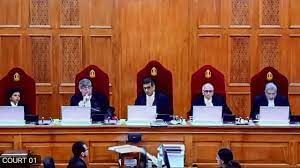
Why in News?
In a momentous judgment, Chief Justice of India (CJI) D Y Chandrachud issued a set of directives aimed at combating discrimination against the LGBTQ+ community and highlighted the urgency of passing laws to formally acknowledge same-sex marriages. This ruling marks a crucial turning point in India's LGBTQ+ rights advocacy, underlining the interplay between legal and societal values.
Preventing LGBTQI Discrimination: Key Directions by CJI
- Safe Houses Creation: The ruling called for the establishment of safe houses, known as "Garima Grehs," in all districts to provide shelter and support to LGBTQ+ individuals facing violence or discrimination.
- Anti-Discrimination Measures: The Centre, States, and Union Territories were urged to ensure LGBTQ+ community members are not discriminated against based on gender identity or sexual orientation. This includes ensuring equal access to public goods and services.
- Public Awareness: The ruling emphasized the need to educate the public about queer identity, stressing its naturalness and refuting any association with mental disorders. It encourages educational efforts to foster understanding and acceptance.
- Hotline Numbers: Authorities were directed to create hotline numbers that LGBTQ+ individuals can contact when experiencing harassment or violence. This initiative aims to offer immediate assistance and support.
- End of Harmful "Treatments": The ruling called for an immediate halt to any "treatments" that attempt to change gender identity or sexual orientation, whether offered by doctors or others. It prioritizes the well-being and autonomy of LGBTQ+ individuals.
- Protection from Family Pressure: Police were advised not to compel LGBTQ+ persons to return to their natal families against their will. Furthermore, the ruling stressed the importance of verifying the claims of LGBTQ+ individuals when they file complaints against their families to ensure their freedom is not restricted.
- Fair Preliminary Investigation: Before registering an FIR (First Information Report) against a queer couple or any involved party, a preliminary investigation should be conducted to ensure the complaint discloses a cognizable offense, preventing unnecessary legal action against LGBTQ+ individuals.
Historical Context
- The ruling underscored that India has a rich history of LGBTQ+ lives, encompassing various identities and communities.
- It emphasized that queerness is not limited to urban settings or privileged classes but exists across different regions, castes, and economic backgrounds
Future Steps
- The ruling has set a precedent for addressing discrimination and ensuring the protection of LGBTQ+ rights.
- Justice S K Kaul expressed the need for a comprehensive anti-discrimination law prohibiting discrimination based on sexual orientation.
- State governments have also been prompted to create guidelines and committees to address LGBTQ+ issues, demonstrating the broader impact of this ruling beyond the courtroom.
Conclusion
- Supreme Court's Decision: Marks a notable milestone in the ongoing fight for LGBTQ+ rights.
- Pending Legislation for Same-Sex Marriages: While formal recognition of same-sex unions through laws is still pending.
- CJI's Directions: Highlight the imperative of eradicating discriminatory practices and fostering inclusivity in Indian society.
- A Path to Equality: The judgment lays the groundwork for a more equitable future for LGBTQ+ individuals in India.
Source: Indian Express
Mt Vesuvius
Subject: Geography

Why in News?
Recently, researchers deciphered ancient scroll buried in the ashes of Mount Vesuvius with the help of artificial intelligence.
About Mt. Vesuvius:
- Active Volcano: Located above the Bay of Naples in southern Italy, this is an active volcano.
- Sole Active Volcano in Mainland Europe: It stands as the single active volcano on mainland Europe.
- Complex Stratovolcano: The volcano falls into the category of a complex stratovolcano due to its eruptions, which typically involve both explosive events and pyroclastic flows.
- Pyroclastic Flow: A pyroclastic flow is a dense mixture of hot lava blocks, pumice, ash, and volcanic gas.
- 79 AD Eruption: Its most renowned event is the eruption in 79 AD, which led to the destruction of the Roman cities of Pompeii and Herculaneum.
- Part of Campanian Volcanic Arc: It is a component of the Campanian volcanic arc, a series of volcanoes that formed due to a subduction zone arising from the convergence of the African and Eurasian tectonic plates.
- Torn Subducting Slab: Underneath Vesuvius, the lower part of the subducting slab has torn away from the upper part, creating a "slab window."
- Chemical Differences: This geological feature results in slight chemical differences in the rocks erupted by Vesuvius compared to those of other Campanian volcanoes like Mount Etna, Phlegraean Fields (Campi Flegrei), Vulcano, and Stromboli.
Source: Indian Express
GS-II
Judicial Perspectives on LGBTQI Marriage and Adoption Issues
Subject: Polity
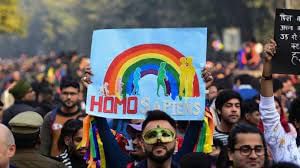
Why in News?
In a recent landmark decision, the Supreme Court, led by Chief Justice of India D Y Chandrachud, deliberated on granting legal status to same-sex marriages.
- This case has sparked significant interest as it explores the intersection of individual rights and societal norms.
Judicial Perspectives on Various Issues:
[A] Fundamental Right to Marry
| Issue | Minority View (CJI) | Majority View |
| Petitioner Argument |
|
|
[B] Interpretation of Special Marriage Act
| Issue | Minority View (CJI) | Majority View |
| Framing the Issue |
|
|
[C] Queer Couples’ Right to Adopt a Child
| Issue | Minority View (CJI) | Majority View |
| Discriminatory Regulations |
|
|
[D] Civil Unions for Queer Couples
| Argument | Minority View (CJI Chandrachud) | Majority View |
| Recognition of Civil Unions |
|
|
Conclusion
- The Supreme Court’s decision on same-sex marriage reflects a complex interplay of legal, social, and legislative factors.
- While the minority view leans towards immediate recognition of civil unions and highlights the importance of individual rights, the majority opinion emphasizes the legislative role in bringing about changes in societal norms.
- The verdict underscores the evolving landscape of LGBTQ+ rights in India and the ongoing dialogue surrounding equal rights and inclusivity.
Source: Indian Express
India-U.K. 2+2 foreign affairs and defence dialogue
Subject: International Relations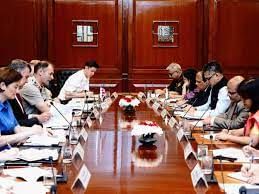
Why in News?
Recently India & the U.K. held 2+2 foreign affairs and defence dialogue in New Delhi.
The dialogue highlights
- Indo-Pacific region: The officials had an opportunity to exchange assessments about recent international developments including in the Indo-Pacific region.
- Both sides exchanged assessments on recent international developments, including in the Indo-Pacific region, in view of the shared vision of the two countries for peace, stability and prosperity and for a “free, open and inclusive Indo-Pacific”.
- Possibilities for further collaboration: The two sides also discussed possibilities for further collaboration, particularly in areas of trade and investment, defence, critical and emerging technologies, civil aviation, health, energy, culture and strengthening peoples connect.
- They discussed ideas regarding counterterrorism, HADR (Humanitarian Assistance and Disaster Relief) and maritime security.
- Recent advancements: Both the countries have expressed happiness on the progress made in diverse areas of India-U.K. Roadmap 2030 including political exchanges, economic cooperation, defence and security, people to people ties, as well as regional and multilateral cooperation.
The 2+2 dialogue
- India has a 2+2 dialogue, either at the level of senior officials or ministers, with close strategic partners such as the US, Japan, Australia and Russia.
- The dialogue between India and the UK featured senior defence and foreign policy officials of the two sides.
India-UK Relations
- About: UK-India relationship is rooted in India’s colonial history with the British and the relationship shared by both countries even after India’s independence.
- The bilateral relationship was upgraded to a strategic partnership in 2004.
- Political: They share a modern partnership which was upgraded to a strategic partnership in 2004.
- The UK supports India’s proposal for permanent membership of the UNSC and is also an important interlocutor for India on global platforms.
- Economic Engagements: Trade: from April 2021 to March 2022 was £25.7 billion, showing a 35.2% increase from the previous year.
- India imported £8.8 billion from the UK, but it exported £16.9 billion to the country.
- Investment: Indian investment in the UK included 107 projects and created 8,664 new jobs, making India the second-largest source of foreign direct investment after the US.
- The UK is the 6th largest inward investor in India, with a cumulative equity investment of US $82 billion (April 2000 – September 2022), accounting for approximately 5.3% of all foreign direct investment into India.
- FTA: India-UK are close to concluding negotiations for a proposed India-UK Free Trade Agreement.
- Defence: In 2015, the two countries agreed to elevate their Defence relationship by establishing capability partnerships in strategic areas.
- The institutionalised dialogue to discuss defence cooperation viz. Defence Consultative Group Meeting, is held annually at Defence Secretary level.
- Ajeya Warrior (army-to-army biennial exercise), the Konakan (joint navy-to-navy annual exercise) and the Indradhanush (joint air-to-air exercise) happen between India and UK.
- Education: Over the last 10 years, the relationship has grown substantially with the introduction of bilateral mechanisms such as the India-UK Education Forum, UK-India Education and Research Initiative (UKIERI), Joint Working Group on Education, Newton-Bhabha Fund and Scholarship schemes.
- Science and Technology: Both announced a new India-UK Global Innovation Partnership which aims to support the transfer of inclusive Indian innovations to select developing countries, starting with Africa.
- The UK is India’s second largest partner in research and innovation collaborations.
- Intentions to cooperate in the fields of Digital Technology and Information and Communication Technologies (ICTs).
- Cultural Linkages: Cultural linkages between India and UK are deep and extensive, arising out of shared history between the two countries.
- There has been a gradual mainstreaming of Indian culture and absorption of Indian cuisine, cinema, languages, religion, philosophy, performing arts, etc.
- 2017 was celebrated as the India-UK year of Culture to mark the 70th anniversary of Indian independence.
- Indian Diaspora: The Indian Diaspora in the UK is one of the largest ethnic minority communities in the country.
- In the 2021 Census, 1,864,318 people in England and Wales were recorded as having Indian ethnicity, accounting for 3.1% of the population.
- Roadmap 2030: The “Roadmap 2030” for India-UK future relations was launched during India-UK Virtual Summit for-
- Revitalised and dynamic connections between people;
- Re-energised trade, investment and technological collaboration that improves the lives and livelihoods of the citizens;
- Enhanced defence and security cooperation that brings a more secure Indian Ocean Region and Indo-Pacific and
- India-UK leadership in climate, clean energy and health that acts as a global force for good.
Source: The Hindu
GS-III
India’s Bid for the 2036 Olympics
Subject: Economy
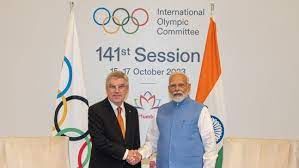
Why in News?
Prime Minister Modi recently confirmed India’s formal bid to host the 2036 Olympic Games, raising questions about the financial implications and benefits of hosting this prestigious event.
About Olympics
| Origins | Began in ancient Greece in 776 BCE in Olympia. |
| Revival | Revived by Pierre de Coubertin in 1896 in Athens, Greece. |
| Five Rings | Olympic flag features five interlocking rings representing unity among 5 continents. |
| Olympic Motto | “Citius, Altius, Fortius” (Faster, Higher, Stronger) reflects the pursuit of excellence. |
| Sports Included | Features a diverse range of sports, from athletics and swimming to archery and gymnastics. |
| Discontinued Sports | Some sports, like tug of war and live pigeon shooting, have been removed. |
Selecting the Olympics Host City
- International Olympic Committee (IOC) Decision: The host city is chosen by the International Olympic Committee members through a secret ballot, with the majority vote determining the winner.
- Competition and Diplomacy: Securing the opportunity to host the Olympics involves significant financial resources and diplomatic efforts. Typically, winners are announced 7-8 years before the event.
Cost of Hosting the Olympics
- Expensive Endeavor: Bidding for the Olympics is a costly proposition, with countries spending $50-100 million, even for unsuccessful bids. In case of a successful bid, the expenses can soar into billions of dollars.
- Examples of Expenditure: Tokyo spent $150 million for its failed 2016 bid and even more for the successful 2020 bid. Toronto refrained from bidding due to the $60 million cost for the 2024 bid.
- Infrastructure Investment: Hosting the Olympics entails building stadiums and enhancing infrastructure to accommodate athletes and tourists.
Funding the Olympics Expenses
- Local Government Responsibility: The majority of expenses, especially on infrastructure, are shouldered by the local government and are spread across the country’s budget.
- Borrowing for Cost Overruns: Countries often resort to borrowing to cover cost overruns. The IOC contributes some revenue to the host country, but it constitutes a relatively small amount, e.g., $1.5 billion for Rio De Janeiro in 2016.
Assessing the Worth of Hosting the Olympics
- Benefits of Hosting: Hosting the Olympics elevates a country’s global status, promotes it as an investment and tourist destination.
- Cautions on Overspending: Excessive spending can have dire consequences, as seen with Canada’s 30-year debt from the 1976 Montreal Games, the impact on Greece’s financial crisis after the 2004 Athens Olympics, and Rio’s $900 million bailout request from the Brazilian government.
- Positive Outcomes: In some cases, such as Beijing, hosting the Olympics led to significant GDP growth acceleration, by at least 0.8%.
India’s Prospects
- Favorable Timing: India’s bid aligns well with its status as the world’s most populous and fastest-growing major economy.
- Past Experience: Having previously hosted the 1982 Asian Games and the 2010 Commonwealth Games, India possesses a favorable track record, which the IOC takes into consideration.
- Gujarat’s Bid: Gujarat is contemplating bidding for the 2026 Commonwealth Games, which could further demonstrate India’s hosting capabilities.
- Economic Power: India’s ascent as an economic powerhouse enhances its candidacy’s appeal to other nations.
Conclusion
- While India’s bid to host the 2036 Olympics presents an opportunity to boost its global profile and economic prospects, it is essential to strike a balance between ambition and fiscal prudence.
- The economic implications, positive and negative, of hosting such a monumental event should be carefully evaluated to ensure that the effort and investment yield substantial long-term benefits for the nation.
Source: The Hindu
Cancer Cells and Chemotherapy
Subject: Science
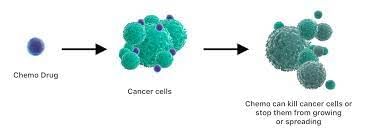
Why in News?
Researchers from the Netherlands Cancer Institute investigated the resistance of some cancer cells to a chemotherapy drug.
About:
- In a new study, published in ‘Cell Reports’, reveals some cells develop Taxol (Paclitaxel) – resistance.
- Taxol (Paclitaxel) is a type of chemotherapy.
- Researchers found that the cell’s sensitivity to Taxol, including its ability to resist Taxol’s anti-cancer effects, related to the location of the ATP Binding Cassette Subfamily B Member 1 (ABCB1) gene inside the cell’s nucleus.
- It highlights the need for more research to uncover the ways in which cancer cells express or silence genes, and opens the door for researchers to develop new ways to ensure anti-cancer drugs remain potent and patients recover faster.
- Chemotherapy eliminates the cancer cells without affecting other non-cancerous cells nearby that are not dividing.
- A characteristic feature of cancer cells is that they divide rapidly, in uncontrolled fashion. Anti-cancer drugs – i.e. chemotherapeutic agents – work by stalling or blocking this proliferation.
- When the division of a cancer cell is arrested, it generally responds by triggering a pathway of programmed cell death, called apoptosis.
- But, any tissue with a significant number of normal cells (for example, cells in the digestive tract, bone marrow, and hair follicles etc) are also dividing and affected by chemotherapeutic agents and suffer apoptosis.
- This cell death underlies the unpleasant side-effects of chemotherapy, such as painful inflammation of the oral cavity and the gut, and nausea, diarrhoea, anaemia, and hair loss.
- The researchers used cells from the human eye retinal pigment epithelium, and found its ability to resist Taxol’s anti-cancer effects.
- A toxin-remover protein, Permeability Glycoprotein (P-gp) became resistant to the anti-cancer drug Taxol.
- The P-gp efflux pump made from RNA was responsible for Taxol-resistance.
- Only the RNA, and not the DNA, enters the cytoplasm where it ‘instructs’ the cellular machinery on the way to link different amino acids to form the protein encoded by a gene.
- It is necessary to find the dose of a drug that effectively kills cancer cells but whose side-effects are not unbearable for the patient.
- Researchers have tried to achieve it by developing Antibody-Drug Conjugates (ADCs) against some cancers.
- An ADC is a drug attached to an antibody that recognises a protein found only on the cancer cells and non-cancer cells are bypassed.
Source: The Hindu
|
38 videos|5264 docs|1112 tests
|
FAQs on UPSC Daily Current Affairs- 18th October 2023 - Current Affairs & Hindu Analysis: Daily, Weekly & Monthly
| 1. What measures has the Chief Justice of India (CJI) listed against LGBTQI discrimination? |  |
| 2. What are some judicial perspectives on LGBTQI marriage and adoption issues? |  |
| 3. What is the significance of the India-U.K. 2+2 foreign affairs and defense dialogue? |  |
| 4. What is India's bid for the 2036 Olympics? |  |
| 5. How do cancer cells respond to chemotherapy? |  |
















